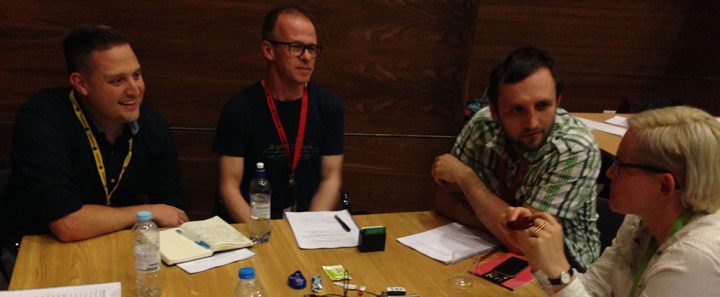6 Ways Leaders Can Start Banishing Their Inner Critic

In order to be effective leaders, we must know how to bring the best out of ourselves as well as encourage the same in others. Therein lies the rub. Despite outward appearances, when in a position of leadership we may still feel like we don’t know enough, that everything we do needs to be perfect, and that at any moment people will find out we don’t know what the heck we’re doing.
Sound familiar? You’re not alone. Often the more we achieve, the louder the voice of self-doubt gets – but the less we’re able to openly acknowledge it, talk about it, and get tools for how to deal with it.
This mean inner voice of self-doubt has a name: it’s called the inner critic. The inner critic is the pernicious force behind our mental blocks. Under the influence of the inner critic, we stick to safe solutions and average ideas. We don’t step up to challenges to expand our skills or our influence. We don’t push our own thinking or that of our team. We don’t innovate or encourage others to do so. The inner critic constrains us, stifles our brilliance, and keeps us stuck in a holding pattern of mediocrity.
But, imagine for a moment the voice of self-doubt being gone. Imagine what you would be able to accomplish and create without that nagging voice dragging you down. Imagine how confident and clear you would be. And then, imagine what it would be like to work with other people with their inner critic silent. Imagine the ideation and synergy you would be able to produce with other people who were letting all of their brilliance in the form of ideas and problem-solving.
To achieve excellence, we must be willing to unlock and access parts of ourselves that we haven’t been able to reach, and embark upon a process of reclaiming our personal power. As leaders, silencing the inner critic help leaders to remove our mental blocks so that we can get the best out of ourselves as well as get the best out of our team members.
It’s clear: in order to become the leaders we’re meant to be, we need to work on banishing our inner critic. So how do we do this? We can start to achieve this noteworthy goal through raising our awareness of our thoughts and instituting new habits.
How to Start Banishing Your Inner Critic
Here are 6 techniques to silence the inner critic so that you can get your non-profit the support it needs and change the world:
-
Monitor your thoughts: choose supportive ones over critical ones
Fill in these sentences with the first words that come to mind:
I can’t _________________ because I’m not as________________ as others.
I shouldn’t __________________ because I haven’t ________________.
If I ____________________, then people will ____________________.You’re probably not surprised to discover that these inner critical thoughts are keeping you from powerfully moving forward. Take heart, however. You’re human. We all have thoughts like this. The good news is that there are effective ways to tame them.
Here is an easy, yet extremely powerful technique to help you practice intentionally focusing on more positive thoughts. Hold both hands up in front of your face, palms toward you. Place all of your attention and focus on your left hand. Imagine that your left hand is holding all of the negative thoughts you’ve been thinking. Now I want you to slowly shift your attention and your focus to your right hand, imagining that your right hand is holding the new positive thoughts that you want to focus on and think instead.
So – is your left hand is still there? Yes it is – it didn’t go anywhere (unless you have a superpower we don’t know of!). Does your left hand and the thoughts it’s holding matter to you while all of your focus is on your right hand? Probably not, as all of your focus and attention is now on your right hand.
While you’re in the midst of a negative thought-storm, employing this technique will help you to strengthen your mindfulness muscles and to see just how much more control over your thinking you have than you thought.
-
Stop trying to fit yourself to someone else’s mold
When we’re focused externally on how we think we’re “supposed” to do something or how we‘re “supposed” to be, we’re trying to fit ourselves into a mold of someone else’s making. We can learn a lot from the wisdom of a toddler who tells her father to “worry about yo’self” as she attempts to unbuckle herself from her car seat.
Take her advice to heart and instead of trying to figure out how you’re “supposed” to be, make effort to be self-referential. Get back to trusting yourself by giving yourself permission to find both your own and your organization’s own way of being and operating in the world, instead of concerning yourself with how you think you should be. Focus on your “why”: what makes you passionate about the work that you’re doing and whose lives you’re ultimately working to improve, then focus on being the best version of you to serve them.
One great way to help this process of learning to readjust trusting yourself again is to “act as if.” Imagine going into a parallel universe where you trust your ability to come up with the right answers, and then your decisions, actions that result of it.
-
Know that you are NOT an impostor (even if you feel like one)
One of the reasons you need to move away from comparisons is because comparing yourself to others often triggers the Impostor Syndrome. If you’re convinced that at any moment you’re going to be found out as a fraud, that you don’t measure up with the rest of your team, and that you need to overcompensate through over-preparation because you’re afraid you don’t know enough, you’re battling with this psychological phenomenon that keeps people from internalizing their successes despite overwhelming evidence to the contrary. Be on the lookout for more symptoms of this “nagging self-doubt” like perfectionism, maintaining a low profile, not owning talents and opinions, never finishing important projects, and feeling disconnected from your achievements.
One of the best ways to combat imposter syndrome is to remember the Imposter Syndrome Paradox, which is as follows:
You will only experience impostor syndrome when you are competent and skilled.
Read this as many times as you need to – in fact, if you’re really afflicted with impostor syndrome, then write it on your mirror or make it your desktop background so that you can really let the message sink in.
By the way, impostor syndrome is not to be confused with the Dunning-Krueger effect, aka “competent incompetence,” where people inaccurately assess their ability and their level of knowledge while failing to recognize the skills of others. If you feel like you’re a fraud, you absolutely do not have Dunning-Krueger’s.
It’s talented people who are the ones who feel that they will be found out as a fraud – people who have an inflated sense of themselves usually are not in this category. So the good news is that if you’re feeling like an impostor, then you are actually uniquely qualified!
-
Remember that Perfection does not equal Excellence
Impostor Syndrome often triggers perfectionism: because we feel lacking in some way, we drive ourselves to be perfect, holding ourselves to ridiculously high standards that we would never hold for others. This can cause us to expend energy and effort towards the wrong pursuits and run ourselves into the ground.
It’s important to realize and understand that perfection and excellence are two totally different things. You can actually do something really well but it doesn’t mean it has to be “perfect.” What’s the difference? Striving for excellence means that you are in active pursuit of experiences that you learn from and enjoy, and then cultivating skills, confidence, and eventually mastery from them. Striving for perfection, on the other hand, typically results in negative feelings from not attaining a certain level of achievement, and then being overly critical of your performance and perceived mistakes.
As you strive for expanding your knowledge, skill, and reach, keep reminding yourself that the goal is excellence – not perfection, and then enjoy the growth process.
-
Trust your ideas
Our inner critics are scared and practice limited thinking. When the inner critic is in control, not only does it make us feel smaller, but it also makes us think small.
Our inner critics make us so terrified of being judged and looking bad in front of others that under its influence, we make a conscious choice to withhold ideas. We commit “ideacide”: a process of self-censoring and killing of the seedlings of ideas before they’re able to get out into the world.
The problem is that ideacide is detrimental to more than ideas. Yes, it erodes our self confidence and negatively impacts our psyches. But ideacide goes beyond the personal. The communities in which we work and operate need us and our ideas – even when these ideas aren’t fully formed. Each of us are a node in our professional and social networks which has an active matrix of ideas that are constantly being interchanged. When we turn off our node through withholding our ideas and denying the contribution of our brilliance, the growth of the idea network suffers.
Trust yourself and your ideas in order to feed your network and encourage the genesis of new ideas.
-
Be good to yourself
Leading is hard work. Make sure you avoid burnout by treating yourself well and refilling your cup. Maybe you don’t need to buy yourself mimosas and fine leather goods (although those are great in their place), but you do need to make sure you pay attention to any signs that may indicate that you’re getting burned out and then adjust accordingly.
In her book, Restore Yourself, author Edy Greenblatt outlines a process for identifying restoring vs. depleting tasks and activities. The trick, says Greenblatt, is to make sure that your scales tip in the direction of the restorative activities.
Start becoming aware of how the scales are tipped in your own workday, and start deliberately seeing where you can Alt(er), Delegate, Delete or the tasks that are draining your energy and brainpower.
- Alt(er) tasks may be doing something as simple as changing the time of the day that you do something so that it better matches your energy, focus, and concentration levels.
- Maybe the task or activity can be Delegated: perhaps there’s a co-worker who actually loves the task that you hate, and you can swap with something they don’t like but you enjoy?
- Finally, there’s Delete for those items that you discover just don’t need to be done – and no kittens will perish if you take them off of your plate for good.
Just as you can’t run a car on an empty tank, don’t expect to be able to do your best while you’re running on the emotional, mental, and soul equivalent of fumes. Take care to take care of yourself so that you may be better able to do your best work.
A Whole New World
Through instituting these practices, you’ll become an empathetic and effective leader with a heightened awareness on the mechanics of mental blocks and self-sabotage. With your increased confidence, you’ll begin to step fully into your power and own your role. And it won’t stop there: through your example and guidance, you’ll cultivate passionate and engaged employees who work better together through high collaborative synergy. With yourself, as well as the rest of your team trusting your ideas, playing to your strengths, and being your brilliance, you’ll be able to grow an outstanding organization.
Reposted with permission from The Concord Leadership Group blog.








